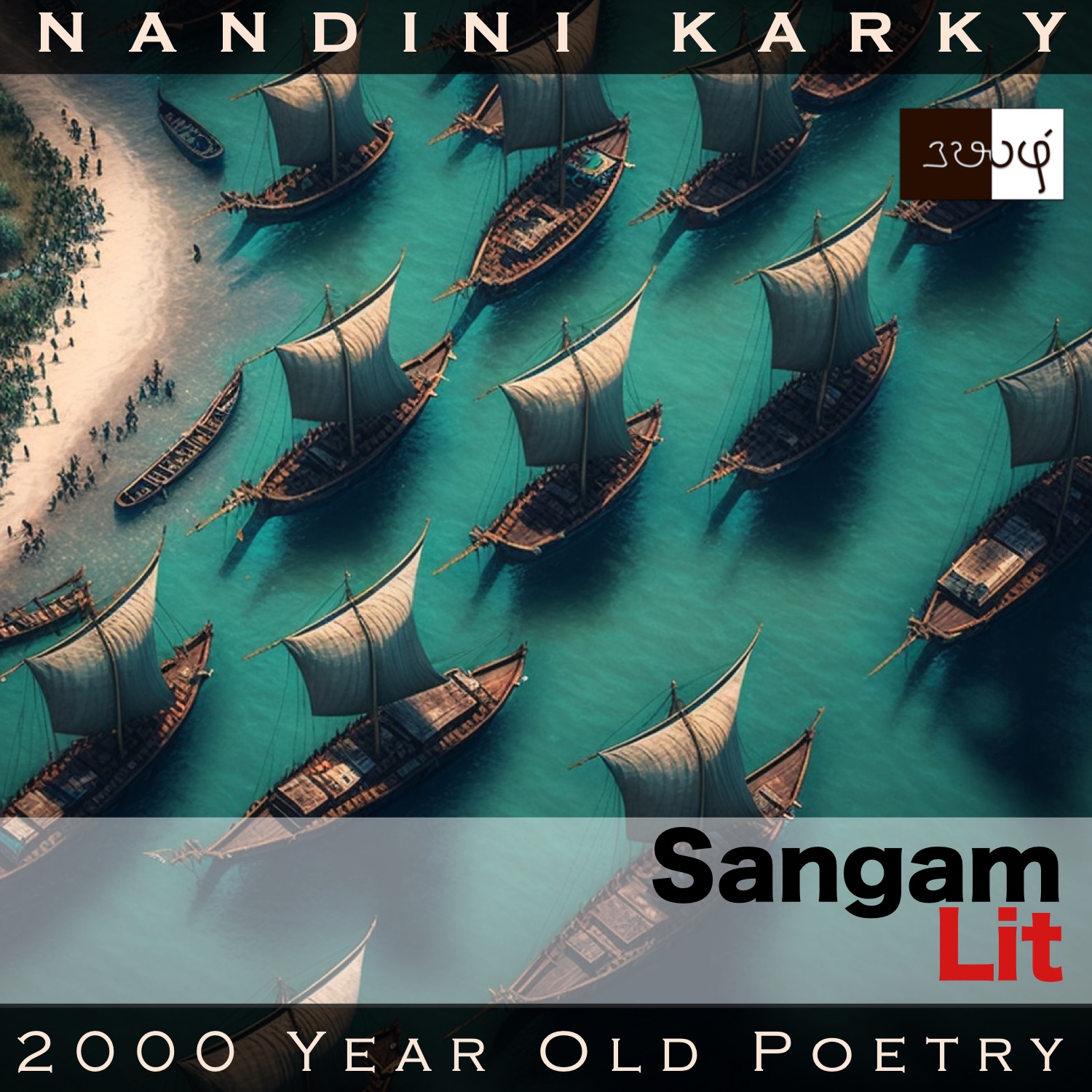Podcast: Play in new window | Download
Subscribe: Apple Podcasts | Spotify | Amazon Music | Android | iHeartRadio | TuneIn | RSS | More
In this episode, we hear of the glory of a king and his land, as depicted in Sangam Literary work, Puranaanooru 126, penned about the Velir King Malaiyamaan Thirumudi Kaari by the female poet Maarokkathu Nappasalaiyaar. Set in the category of ‘Paadaan Thinai’ or ‘King’s praise’, the verse relates the immense power of this patron in pulling poets to sing of his fame.

ஒன்னார் யானை ஓடைப் பொன் கொண்டு,
பாணர் சென்னி பொலியத் தைஇ,
வாடாத் தாமரை சூட்டிய விழுச் சீர்
ஓடாப் பூட்கை உரவோன் மருக!
வல்லேம் அல்லேம் ஆயினும், வல்லே
நின்வயின் கிளக்குவமாயின், கங்குல்
துயில் மடிந்தன்ன தூங்கு இருள் இறும்பின்,
பறை இசை அருவி, முள்ளூர்ப் பொருந!
தெறல் அரு மரபின் நின் கிளையொடும் பொலிய,
நிலமிசைப் பரந்த மக்கட்கு எல்லாம்
புலன் அழுக்கு அற்ற அந்தணாளன்,
இரந்து செல் மாக்கட்கு இனி இடன் இன்றி,
பரந்து இசை நிற்கப் பாடினன்; அதற்கொண்டு
சினம் மிகு தானை வானவன் குட கடல்,
பொலம் தரு நாவாய் ஓட்டிய அவ் வழி,
பிற கலம் செல்கலாது அனையேம் அத்தை,
இன்மை துரப்ப, இசை தர வந்து, நின்
வண்மையின் தொடுத்தனம், யாமே முள் எயிற்று
அரவு எறி உருமின் முரசு எழுந்து இயம்ப,
அண்ணல் யானையொடு வேந்து களத்து ஒழிய,
அருஞ் சமம் ததையத் தாக்கி, நன்றும்
நண்ணாத் தெவ்வர்த் தாங்கும்
பெண்ணை அம் படப்பை நாடு கிழவோயே!
An interesting verse that not only brings out the greatness of this king but in a tangent, also that of a poet who has previously sung about this ruler. This poet’s words can be translated as follows:
“Taking gold from the ornaments of enemy elephants, making heads of poets glow, you crowned them with unfading lotuses, O great leader, the heir of ancestors, who never shirked the battlefield!
Even though I lack the skill, I speedily arrived to sing of your praises, O lord of Mulloor, where cascades roar like drums, amidst jungles where darkness hangs like the sleep of midnight;
‘In the tradition of indestructibility, may you flourish with your kith and kin’ sang that respected poet, who has the most flawless skill amidst all people of the land, making your fame spread and sustain, giving no room for other supplicants. This is akin to how, in the western seas, when Cheran with raging armies, had sent his ships that bring gold, other ships dare not ply.
However, as poverty goads us, and your fame pulls us, we too sing seeking your generosity, O great lord, who, as drums roar aloud like thunder that kills snakes with sharp teeth, ruins kings with esteemed war elephants, attacks and destroys in the battlefield, and blocks enemies far off -The ruler of the beautiful country, where the River Pennai flows!”
Let’s explore the details herein. The poet starts by depicting something this king does, which is to take the gold from the ornaments on defeated enemy elephants and turn them into golden lotuses to be rendered unto the poets, who come seeking his favour, and she describes how although she does not think of herself capable enough, she has come to sing his praises and describes his land as one where cascades resound aloud like drums in the midst of the pitch dark jungles.
How humble of the poet to call herself as someone lacking in skill! She further details the reason for her lack of confidence saying about how Kabilar has sung about the fame of this great king, so exquisitely that there’s no space for others to add anything. To etch this thought, she brings in the greatness of the Chera king, whose gold-bearing ships dominate in the western seas, making ships of others fear to tread those waters. This highlights the maritime trade and power of the Chera kings, who controlled those ancient ports in the region called as Kerala today and exchanged their riches with the nations in Africa, Middle-East and even Greece and Italy of ancient times.
Although Kabilar’s greatness is indeed formidable, still driven by the forces of poverty that oppress and attracted by the renowned generosity of the king, the poet says she too has come to sing of the praises of this great lord. To portray his greatness, she talks of how his war drums roar like thunder. Do you recollect how she described a few words ago how the cascades in this country roar like drums? From cascades to drums to thunder, the poet extends her ripples of similes! Returning, we see when those drums roar like thunder, the king destroys his enemy kings and their towering elephants. And thus, protects his magnificent country made fertile by the River Pennai, the poet concludes.
River Pennai called as ‘Then Pennai’ in contemporary Tamil starts in Karnataka and flows through the districts of Krishnagiri, Dharmapuri, Villupuram, Cuddalore of Tamilnadu and ends in the Bay of Bengal. This river is crucial to the agriculture, irrigation and bio-diversity of this region. Returning to the poet’s hesitation in singing about this king, we can infer that she considered Kabilar and his works as creations par excellence and that she herself was no match for him. In another similar instance, we saw how the female poet Avvaiyaar sings of the greatness of another male poet Paranar in one of her verses. I wonder if any male poet has sung likewise of the greatness of a female poet from this time. Even if they haven’t, I’m content to think that these women, no matter how self-deprecating, had a voice, making their words echo, if not like the resounding drums of the men’s voices, like the gentle but unforgettable strings of a lute!




Share your thoughts...